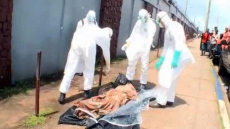After the discovery of a human skeleton at the Amphipolis burial complex in northern Greece this week, the focus of experts has turned to the DNA testing which could help reveal the identity of the "owner" of the magnificent massive tomb.
The list of the candidate occupants of the tomb is still extensive. It includes several family members and close aides of Alexander the Great, according to archaeologists, Xinhua reported.
However, lab measurements which could give answers to the riddle, will take up to six months, or even a year, otherwise they may lead to false conclusions, Greek specialists warned.
The skeleton can shed light to the mystery of who was buried in the tomb in the 4th Century BC more than the sculptures, the mosaic and any other finding which has been unearthed during the dig since August, they stressed.
Therefore the next step for experts includes bone analysis and DNA testing of the remains found.
The DNA material will be sent to the Institute for Bimolecular Studies in Manchester University, which is in close cooperation with the Greek lab responsible for the antiquity measurements, "Demokritos".
According to the director of "Demokritos" lab Yannis Maniatis, the procedures of the DNA testing take time.
The most immediate answers that can be given from the DNA analysis can reveal the buried person's height, sex and age.
In addition, the DNA material of the Amphipolis skeleton will be compared with the DNA profile of those buried in the Royal Vergina tomb, to determine whether the person buried in Amphipolis is of royal descent related to the royal family of Vergina.
Alexander the Great's father was among the occupants of the Vergina tombs discovered also in northern Greece four decades ago.
In a second phase scientists believe that with the Amphipolis skeleton skull in their hands they could also reconstruct the head of the Amphipolis occupant.
It will not be the first attempt to reconstruct an ancient Greek face based on the human remains found in a tomb.
In 2010, Orthodontics professor at the University of Athens Manolis Papagrigorakis, who specialises on archaeological skulls, presented the head of Myrtis, an 11-year-old girl from ancient Athens, whose skull was unearthed in excellent condition from a mass grave and was recreated.
The original skull was replicated via three-dimensional modeling and rapid prototyping techniques, giving the opportunity to admire for the first time in the world an ordinary ancient Greek girl.





